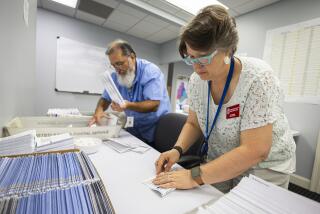Task Force Urges Florida Officials to Eliminate Punch Cards, Paper Ballots
- Share via
TALLAHASSEE, Fla. — A task force recommended Friday that Florida get rid of punch card and paper ballots and use optical scanning equipment in all 67 counties during the 2002 election.
However, the panel said the state should delay investing up to $200 million for touch-screen voting technology, citing a recent study that found the equipment may have as high an error rate as the much-maligned punch cards.
“Instead of investing a huge amount of money now for an entire revamping of the Florida election system, we should spend enough money to have a universal system for the next election or two,” task force co-chairman Tad Foote said.
Gov. Jeb Bush formed the task force after the November presidential election dragged out five weeks while Al Gore challenged the 537-vote victory of his brother George W. Bush.
Democrats demanded recounts, claiming many votes went uncounted because of flaws in the punch card system. Election workers sifted through thousands of ballots to determine voters’ intentions when they turned in partially punched ballots that could not be read by machines.
Although some legislators have balked at establishing a statewide system, Secretary of State Katherine Harris said she supports doing away with punch cards and leasing optical scanning equipment in time for the next statewide election.
“Without question, no more punch cards,” Harris said Wednesday in anticipation of the panel’s 65-page report.
Currently, 41 of Florida’s counties use optically scanned ballots, on which candidates’ names are placed next to ovals that can be filled in with ink.
The task force also recommended establishing “user-friendly standards” when evaluating voting equipment.
“Discarding ballots that may have errors caused by machines or faulty ballot design, rather than caused by voters, seems to be the height of bureaucratic arrogance,” the report said.
The task force also suggests that lawmakers spend $3 million to create a statewide online voter registration system, create and publish a voters’ bill of rights, help counties pay for voter education and make the elected post of county supervisor a nonpartisan position.
More to Read
Sign up for Essential California
The most important California stories and recommendations in your inbox every morning.
You may occasionally receive promotional content from the Los Angeles Times.













